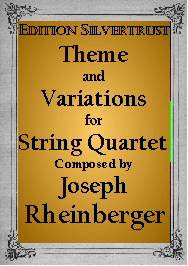Presents
Joseph Rheinberger
|
|
Theme & Variations for String Quartet, Op.93
 Writing
of this work, Wilhelm Altmann, perhaps the greatest-ever chamber music critic,
remarks,
Writing
of this work, Wilhelm Altmann, perhaps the greatest-ever chamber music critic,
remarks,
“The Theme with Variations for String Quartet, Op.93, is one of the grandest passacaglias ever written. No quartet society which prides itself on artistic programs should neglect it.”
Joseph Gabriel Rheinberger (1839-1901) was born in Vaduz, the capital of Liechtenstein. At the age of 5, young Joseph was given piano and organ lessons from a local teacher. His talent was immediately discovered and was of such a substantial nature that with the help of a scholarship he was sent to the Royal Conservatory in Munich where he studied with Franz Lachner, one of Schubert’s close friends and an important composer in his own right. Rheinberger, who remained in Munich for the rest of his life, was in great demand as an organist and choral master. He eventually became conductor of the important Munich Choral Society and served as voice coach at the Royal Opera where he got to know Wagner. He also taught at the Royal Conservatory where he held the position of Professor of Composition for nearly 40 years.
Remembered today only for his organ compositions which are considered the most important ever written after those of Bach, during his life time Rheinberger was a much respected composer, generally ranked after Brahms and Wagner as the most important living German composer. Furthermore, he was also generally regarded as the leading teacher of composition during most of his lifetime. Among his many students were Humperdinck, Wolf-Ferrari, George Chadwick (whose quartets we are publishing) and Wilhelm Furtwangler.
The Theme and Variations is surely one of the most extraordinary and effective pieces ever written for string quartet. There is not a superfluous note. It is the cello playing solo which softly gives out the theme (heard in our first soundbite) upon which the subsequent 50 variations are based. While none of the eight measure variations are repeated, the magnitude and tremendous scope of this work cannot but impress both listener and player. Rheinberger’s highly sophisticated manner of treating a theme and variations is literally a compendium of techniques for composers which even surpasses Beethoven in this respect. Space does not permit us to discuss these variations in detail but we have tried to include some representative examples of them as soundbites.
While it is very hard to capture in words the sense of what this work is like, nonetheless it must be said that it is a little masterpiece not to be missed by either professionals or amateurs.
Parts: $19.95